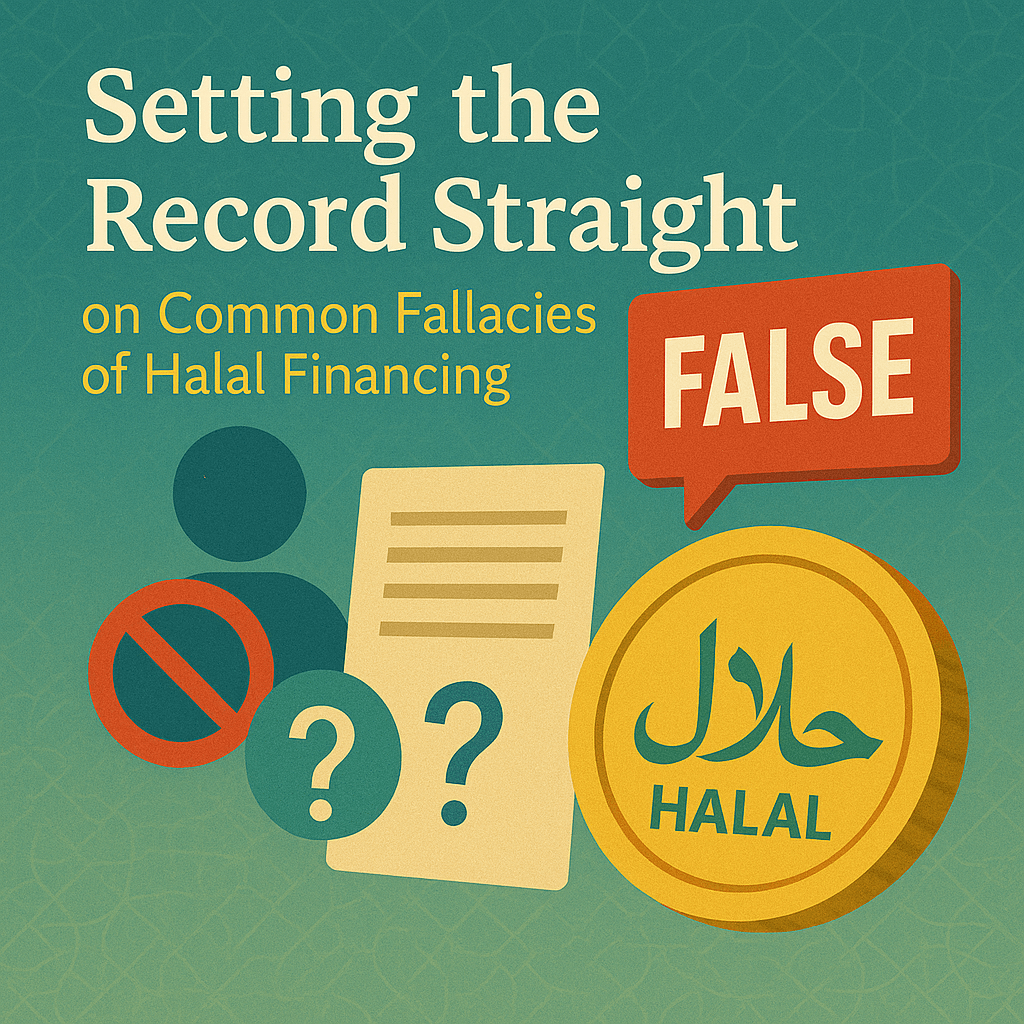
Setting the Record Straight on Common Fallacies of Halal Financing
A Quarterly Newsletter Publication of Tjara Financing
Despite its growing popularity, halal financing is still misunderstood by many Canadians. It is necessary to address these misconceptions in order to promote greater acceptance and understanding of this ethical alternative.
1. Halal Financing Is Only for Muslims
Although halal financing is prepared to meet Muslim clients’ needs, its principles appealing to anyone seeking ethical financial solutions are fairness, transparency, and shared risk. Thus, non-Muslims will also benefit from such an option provided they value these principles, making it all-inclusive for all Canadians.

2. Halal Financing Is More Expensive
The most common misconception is that halal financing is always very much more expensive than conventional mortgages. Now, of course, the structure of halal financing may be different, but Tjara providers have tried to allow competitive pricing that reflects the true cost of the transaction without hidden fees or interest.
“Allah has permitted trade and has forbidden interest”
QURAN, 2:27
3. Halal Financing Is Complicated
The partnership-based models used in halal financing can be very complex at first glance, but providers like Tjara take a step forward in demystifying the process through transparency and education. Clients are guided through every step of their financial journey, ensuring they fully understand their agreements and feel confident in their decisions.

The Increasing Importance of Education in Halal Financing
The most important obstacle to the wide-scale adoption of halal financing in Canada is a lack of awareness and understanding. Most people, including Muslims, do not know how halal financing works or what it offers. This knowledge gap makes education an essential foundation for growth in this sector.
Tjara Halal Financing has noted this gap and has taken proactive steps to educate its customers and wider society about ethical finance. From workshops, webinars, to online resources, Tjara empowers that one can make the best and informed financial decisions that resonate with their values.
1. Financial Literacy for First-Time Homebuyers
The most significant financial decision a person makes is the purchase of a home, but the process scares first-time buyers. Tjara addresses this challenge by offering tailored educational programs that break down the complexities of halal financing into simple, digestible information.
These programs range from understanding the Diminishing Musharaka model to navigating the Canadian housing market. By giving clients the information they need, Tjara ensures that his clients feel comfortable and supported every step of the way in the homeownership journey.
2. Demystifying Shariah Compliance
For many Canadians, the very idea of Shariah compliance sounds foreign, almost arcane. Tjara’s educational efforts seek to demystify these principles, making clear their global appeal and relevance. In short, the emphasis on fairness, transparency, and shared risk lies at the heart of any individual seeking ethical alternatives to conventional finance and has absolutely nothing to do with religion.
By presenting halal financing as an inclusive and values-based solution, Tjara is bridging cultural divides and promoting greater acceptance of Islamic finance in Canada.
O you who believe! do not devour your property among yourselves falsely, except that it be trading by your mutual consent.
QURAN 4:29
3. Community Organizations Partnership
Tjara’s commitment to education is not limited to individual clients but also includes partnerships with community organizations, mosques, and non-profits. Such partnerships enable Tjara to reach a larger audience and deliver tailored financial literacy programs addressing the unique needs of different groups.
For example, Tjara collaborates with local mosques to conduct seminars on halal financing that not only give practical insights to the attendees but also answers all the questions they have with a caring environment. These efforts not only increase their awareness but also bond Tjara closer to the communities it serves.
Technology as an Enabler of Growth in Halal Financing
In today’s fast-paced world, technology plays a very important role in enhancing accessibility and convenience across industries—and halal financing is no exception. Tjara has embraced digital innovation to streamline its services and ensure that clients can access ethical financial solutions with ease.
1. User-Friendly Digital Platforms
The online portal by Tjara has a user-experience centric approach and ensures the simplest interface through which application processing becomes a much smoother task. From home, clients can surf the various options available in terms of financing, estimate the cost, and also follow the applications made for loans.
This level of convenience is significant in Canada where geographic distances will sometimes be against face-to-face consultations. It is through using technology that Tjara manages to make all its services reach the clients of all provinces; from major cities to remote communities.
2. Personalized Financial Tools
With each client having a different financial condition, Tjara provides unique tools and calculators to determine the best financing options for their needs. This tool considers factors such as income, property value, and repayment capacity, making recommendations that align with the goals of the client.
3. Improving Transparency Through Technology
The core of halal financing is transparency. Tjara uses technology in order to abide by this. Their digital platform gives clients up-to-date real time information regarding their applications and the status of their transactions.
In addition, through online services, Tjara provides information on financing models, while the clients can fully understand the terms and conditions before signing an agreement. This transparency leads to trust and allows further support for the Tjara’s reputation as one of the leaders in ethical finance.
